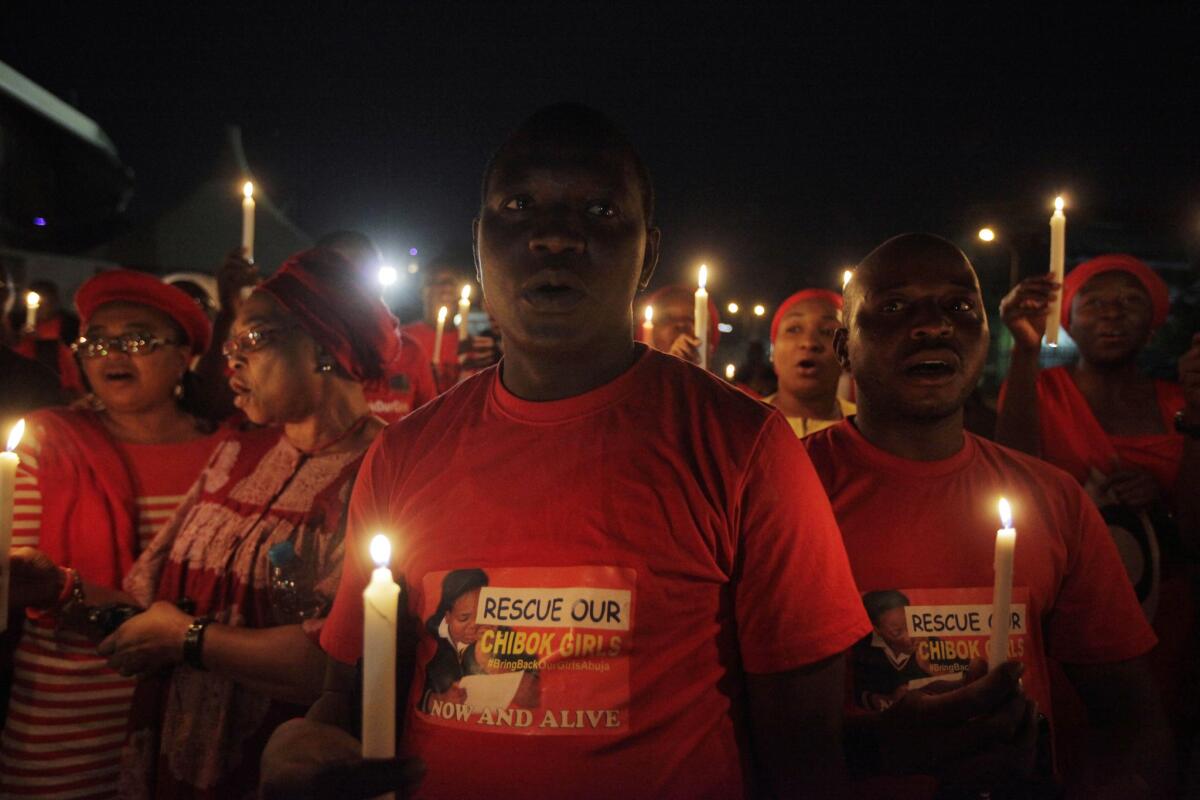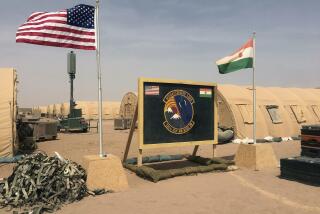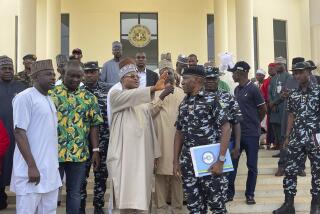U.S. officials frustrated by Nigeria’s response to girls’ kidnapping

As American military and intelligence specialists joined the hunt for Nigeria’s missing schoolgirls, U.S. officials expressed frustration Thursday with the country’s inability to act on fresh intelligence about the Boko Haram extremists who took more than 200 teenagers captive and threatened to sell them into slavery.
Imagery from U.S. surveillance drones and satellites over the last week has shown suspected bands of Boko Haram militants setting up temporary camps and moving through isolated villages and along dirt tracks in northeastern Nigeria, U.S. officials say.
The Obama administration has shared the imagery with Nigerian President Goodluck Jonathan’s government in Abuja. But Nigeria’s security forces are hampered by poor equipment and training and have failed to respond quickly, said a U.S. official familiar with the growing search operation.
U.S. Defense officials believe militants with Boko Haram, a militant Islamic sect, split the girls into several groups after the April 14 abduction from a government-run school in Chibok village. The leader of the militants, Abubakar Shekau, said this week that he would release some of the girls in exchange for imprisoned members of his group.
Bolstered by international help, the Nigerian-led search has now expanded to include an ungoverned area of desert and scrub roughly the size of West Virginia that crosses the porous borders into neighboring Chad, Niger and Cameroon, U.S. officials say. The girls’ locations are still unknown, however.
Mounting U.S. frustration with the case spilled into the open Thursday at a Senate hearing.
“It is impossible to fathom that we might have actionable intelligence and we would not have the wherewithal — whether by the Nigerians themselves or by other entities helping the Nigerians — to be able to conduct a rescue mission,” said Sen. Robert Menendez (D-N.J.), chairman of the Senate Foreign Relations Committee.
“In general, Nigeria has failed to mount an effective campaign against Boko Haram,” Alice Friend, the Pentagon’s principal director for Africa, told committee members. “In the face of a new and more sophisticated threat than it has faced before, its security forces have been slow to adapt with new strategies, new doctrines and new tactics.”
Parents of the abducted girls have complained that they reported the location of the militants and the girls days after the kidnapping but that security forces did not respond. Jonathan reportedly plans to fly to Chibok on Friday for the first time since the girls were seized.
In addition to the U.S. drones and satellite coverage, a manned U.S. surveillance plane has been flying sorties over Nigeria this week. The British government has pledged to send a surveillance aircraft, and France, Israel and China have offered to share intelligence and satellite imagery, officials said.
The U.S team of about 30 advisors includes military experts in logistics, communications and information sharing. The White House has said it has no plan to send troops to take an active part in search-and-rescue operations.
U.S. options are limited. A 1997 law prohibits American forces from working with foreign military units that have been accused of chronic human rights violations. The law has prevented U.S. officials from dealing with a Nigerian counter-terrorism unit that has experience tracking Boko Haram, officials said.
Boko Haram’s brutal insurgency has created widespread fear in northeast Nigeria, but the military’s harsh operations have left many villagers distrustful of authorities and unwilling to pass on tips, U.S. experts say.
Human rights groups have documented widespread abuses by Nigerian forces over the last few years, including the burning of homes and farm buildings, shooting suspected Boko Haram members as revenge for attacks on police, and detaining young men indefinitely without trial.
The army and police “are not disciplined and are very abusive,” Sarah Margon, the Washington director of Human Rights Watch, said Thursday.
Many Nigerians believe the military responds only when Boko Haram fighters attack government facilities, not when they kill civilians, said Lauren Ploch, an Africa specialist at the Congressional Research Service.
Boko Haram, meanwhile, has built up an arsenal of weapons and a fleet of trucks stolen from police stations and military barracks.
Robert Jackson, a State Department specialist on Africa, said at the Senate hearing Thursday that militants had killed more than 1,000 people this year in attacks on churches, mosques, schools and security outposts. The group drew little international attention until it vowed to sell the abducted girls as slaves.
Boko Haram initially styled itself after the Taliban in Afghanistan, claiming it wanted to create a strict Islamic state in Nigeria.
Boko Haram was added to the U.S. list of foreign terrorist organizations last year.
U.S. officials say some of its fighters received training and weapons from the group Al Qaeda in the Islamic Maghreb, a North African offshoot of Al Qaeda. French troops destroyed training camps in Mali early last year, however, Defense officials said. Since then, outside financial and training support for Boko Haram has waned.
Partly as a result, Boko Haram intensified a kidnapping campaign that has generated large ransoms, said a U.S. counter-terrorism official who spoke on condition of anonymity to discuss sensitive information.
U.S. officials say intelligence on Boko Haram is sketchy. They estimate that 300 trained fighters have joined the group. The total swells to about 3,000 if financial and other supporters are included.
Times staff writer Robyn Dixon in Johannesburg, South Africa, contributed to this report.
More to Read
Start your day right
Sign up for Essential California for news, features and recommendations from the L.A. Times and beyond in your inbox six days a week.
You may occasionally receive promotional content from the Los Angeles Times.







